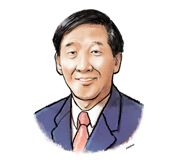
Park Geun-hye must enforce affirmative action
President-elect Park Geun-hye has pledged to recruit highly qualified people for various government posts fairly. According to her, such impartial recruitment is necessary to end the vicious cycle of division and hatred that has haunted South Korea for the past half century.
Park’s predecessors have reneged on their promises of fairness. They have installed cronies in three key posts — the prime minister, the chief of staff and the director of the National Intelligence Service. They have also appointed family and friends to other prominent posts, such as the prosecutor general, the commissioner general of the Korean National Police Agency, the commissioner of the National Tax Service, and the chairman of the Financial Service Commission and the chairman of the Korea Fair Trade Commission. To gain some semblance of equal representation in the Cabinet, they installed non-cronies at ceremonial posts in minor ministries such as agriculture and construction.
Former liberal heads of state, including Kim Dae-jung and Roh Moo-hyun, have been known for their cronyism, but no more so than Lee Myung-bak. Lee has been nicknamed a leader of revolving-door personnel management, as he rotated his cronies in key posts. This practice weakened the influence of ministers and strengthened the voice of presidential secretaries. Many of Lee’s cronies, including his elder brother Lee Sang-deuk, have been jailed for bribery and abuse of power. According to Park, such parachute-style appointment is unfair to the people and dangerous to democracy, and thus needs to stop.
President Lee’s cronyism and cliquishness also affected the recent election significantly. Park gained only 10.5 percent of the votes in the southwestern region. Similarly, Park narrowly lost in Seoul, where many voters hail from the southwestern region. President Lee has worked mostly with figures from the opposite southeastern region.
Although President Lee has cited data that showed his fairness in personnel recruitment, many government officials dispute the validity of such data. For example, a former government official said that Lee’s discriminatory and sometimes retaliatory practices in personnel recruitment were unprecedented, going beyond government posts. Lee’s cronies have also been appointed to private enterprises such as commercial banks (including the KB Financial Group and Woori Financial Group), telecommunication companies (such as KT) and steel companies (POSCO).
Corruption pervades the entire Korean society, not just the government. For instance, conglomerates promote friends of those in power to facilitate government relations. Meanwhile, professors who hunger for fame, power and money vie for government and public posts. Consequently, the public has suggested that political professors should not be guaranteed tenure after completing government services.
President-elect Park should learn from other world leaders who fought against cronyism. For instance, former U.S. President Abraham Lincoln appointed exceptional individuals to key posts, regardless of such individuals’ political leanings. Another great example is King Yeongjo (1694–1776), the longest reigning king of the Joseon Dynasty.
According to history, the king recruited scholars from various social classes for key posts in order to prevent political partisanship. In fact, the king adopted a quota system to ensure no single social class dominates the government. This policy resembles those of many governments today, such as the affirmative action in the U.S. and positive discrimination in the UK, which aim to provide equal opportunity in the areas of employment, education and business to the various social classes and groups.
In his book, “The History of Korea,” Kim Kil-djun states that “Yeongjo’s rein was remarkable and in all regards was probably most notable of the dynasty, second only to Sejong the Great, the inventor of the Korean alphabet Hangeul.”
The king did not tolerate corruption, and was reported to have deployed secret governmental inspectors to identify corrupt officials. Another testament to King Yeongjo’s fairness is the sinmungo drum, a large drum that hung on a gate tower at the royal palace compound. Citizens struck the sinmungo in order to make their complaints known to the king. In sum, the king had the three traits of a great leader—impartiality in personnel recruitment, open communication with the people and intolerance for corruption.
President-elect Park’s victory has broken many political records. Park is the nation’s first woman president. She obtained more than 15 million votes, representing 51.6 percent of the electorate and the largest number of votes in the history of Korea’s presidential elections. She is also so far the only first lady-turned-head of state.
President-elect Park needs to prove herself to skeptics, who worry that she may, like her father, the late President Park Chung-hee, succeed in economics but not in politics. One way to disprove her detractors is to keep her promises, including that of appointing government officials impartially. She should appoint only 10 percent of some 10,000 government and public posts, and let each agency appoint the rest. This affirmative action will help move her national agenda forward.
The public’s expectation of President-elect Park is very high. In order to leave a positive and lasting legacy in Korean history, as King Yeongjo did, she needs to appoint government officials fairly, communicate with the people openly and fight corruption.
Lee Chang-sup is the executive managing director of The Korea Times. Contact him at editorial@koreatimes.co.kr. <The Korea Times/Lee Chang-sup>


